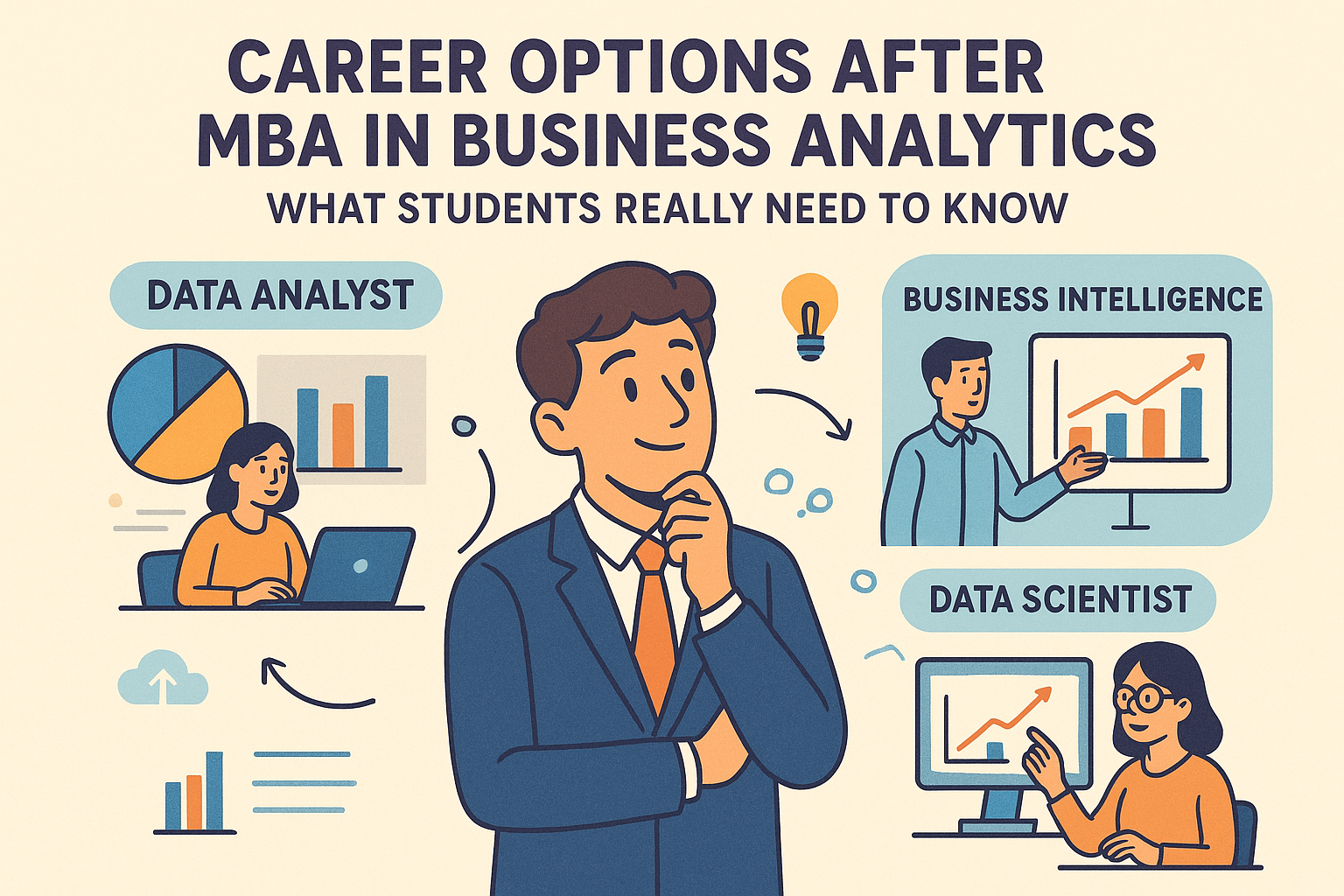If you’ve been thinking about doing an MBA in Business Analytics, you’re not alone. A lot of students today are confused between so many specialisations—Finance, HR, Marketing, even newer ones like Digital Marketing—but Business Analytics is the one that keeps popping up everywhere.
Honestly, it’s because companies have become obsessed with data. Every small thing is being recorded, tracked, and measured. You open Netflix? Data. You scroll on Instagram? Data. You order food? That’s data too.
And so naturally, businesses need people who understand what to do with all this information. That’s where an MBA in Business Analytics comes in.
Before even deciding on the course, most students first explore things like the Top MBA Colleges this post actually helps or try understanding which is the best MBA specialisation this one clears confusion
But if you’re specifically leaning toward analytics, let’s break things down simply.
So… what exactly is MBA Business Analytics?
To put it in the simplest way, it teaches you two things:
- How businesses run
- How data helps them make smarter decisions
You’ll learn tools like SQL, Excel, maybe a bit of Python, and how to read dashboards and reports. It’s not hardcore coding, and it’s not only maths. It’s more like: “Here’s the data. Now tell us what it means for the business.”
This is why keywords like business analytics, MBA analytics, data analytics jobs, and even business analyst MBA keep trending.
Why companies love MBA analytics graduates now?
Earlier, decisions were made based on intuition or experience. Now it’s all data-driven. Brands want to know:
Which customer is likely to buy,
Which product will flop,
Which marketing campaign is worth the money,
What’s the next trend in the market, and honestly, sometimes even what people are thinking.
That’s where roles related to data science, big data, and data management are booming like crazy.
Career Options After MBA in Business Analytics (Explained like a friend, not a textbook)
Here are the roles you’ll hear about most often:
- Business Analyst
Probably the most common one. Here, you become the “problem solver.” You look at data, identify what’s going wrong, and suggest solutions.
A lot of freshers start here because the learning curve is great.
2.Data Analyst
As you build skills like Excel, SQL, Power BI, Python, and Tableau, your overall market value increases too. If you’re curious about how these skills actually influence salaries, the Data Analyst Pay Trends guide breaks down how each skill affects pay levels in India and internationally.
3.Data Scientist
A more advanced role. You work with predictions, machine learning, and deeper analysis. Companies usually hire Data Scientists when they want to forecast outcomes or build automated systems.
4.Marketing Analyst
If you like the creative side but still enjoy analysing numbers, this is a sweet spot. Marketing analysts study campaign data, customer behaviour, online ads, and trends.
- Financial Analyst / Risk Analyst
A great option for commerce students who like finance but want a modern analytics twist. Here you analyse markets, financial statements, and risk factors.
- Product Analyst
Tech companies rely heavily on Product Analysts to understand how users behave inside apps and websites. You basically study:
What people click
How long they stay
What annoys them
Why they uninstall
It’s a very user-psychology-meets-data kind of role.
7.Big Data roles
This is for students fascinated by large systems and huge datasets. You might help companies organise massive amounts of information and use it properly.
Salary After MBA Business Analytics (Honest expectations)
Salaries depend on skills, college, and the company, but here’s a realistic idea:
| Jobs | salary |
|---|---|
| Business Analyst | ₹6–12 LPA |
| Data Scientist | ₹5–10 LPA |
| Data Analyst | ₹12–25 LPA |
| Product Analyst | ₹8–20 LPA |
| Big Data roles | ₹10–22 LPA |
A lot of students search for MBA business analytics salary, MBA data analytics salary, or MBA in data analytics salary, and honestly, the growth is fast because experience + analytics is a powerful combo.
Skills you actually need (not the overhyped ones)
You don’t need to be a coder. You don’t need to be a maths topper. What you do need is:
- Decent SQL knowledge
- Strong Excel
- One BI tool like Power BI or Tableu
- Ability to understand business problems
- Logical thinking
- Ability to communicate insights clearly
- Basic understanding of machine learning (optional)
- Fundamentals of data management
If you have these, you’re good.
FAQs
Q1. Is it good for non-technical students?
Ans. Yes. Some of the best business analysts come from commerce backgrounds.
Q2. Is it the same as Data Science?
Ans. No. Data Science is more technical. MBA analytics is business-oriented.
Q3. Does it have scope?
Ans. Massive scope. Every industry is using analytics now.
Q3. Is MBA Business Analytics better than a plain Data Analytics course?
Ans. It depends on what you want. If you’re looking for a technical, tool-heavy career, then a pure Data Analytics course is good. But if you want a broader role where you handle strategy, business decisions, leadership responsibilities then an MBA in Business Analytics makes more sense. It opens more managerial doors in the long run
Q4. Is coding compulsory for MBA in Business Analytics?
Ans. Not at all. Basic SQL helps a lot, and you might touch a bit of Python during the course, but none of it is heavy programming. Most analytics roles for MBA graduates are more about interpreting data, not building complex algorithms. Coding is an advantage, not a requirement.
Q5. What is the starting salary after MBA in Business Analytics?
Ans. Most freshers earn around ₹6–12 LPA depending on college, skills, and company.

